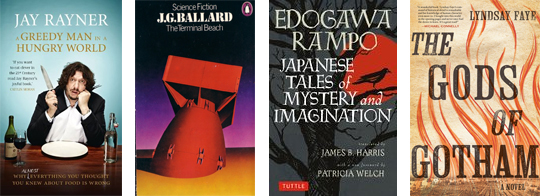re:View – The 2016 Bookshelf: July
So, after ending a six-year relationship and finding a home for myself and my two kitties in the first half of the year, I will admit it has taken some time to settle back into a new routine. And with all the moving and sorting out a new flat, books moved pretty close to the bottom of the priorities list – temporarily, of course. Just managed to stick with my book-a-week minimum once again. And a rather random selection at that!

A Greedy Man in a Hungry World by Jay Rayner
You may know Jay Rayner as the slightly annoying food critic from the Guardian and Masterchef, and I have to report that while he makes some interesting points in his book, he’s also a bit annoying as an author. Greedy Man is part very good and party very annoying. The good part: it told me a lot of things I didn’t know about the UK’s food industry (and the supply chain in the wider world) and as someone who cares about what I eat and where it comes from, I found those things both informative and though-provoking. The bad part: Rayner’s an opinionated bastard (I have a hunch he would take this as a compliment) and won’t miss a single opportunity to get on his soap box. Fair enough so far – it’s his book after all. And I do like a good rant, actually. However, some of his opinions seem just a little too self-congratulatory to be enjoyable, and too obviously aimed at causing insult to come across as sincere. This bit I can forgive him; it’s an occupational hazard that comes with journalism. But when it comes to the structure and planning of the book, I won’t take any excuses – because he is a journalist. Greedy Man suffers as an overall product from a lack of coherence, sitting in between the essay collection and the memoir without really being either. While both the essays and the memoir episodes are enjoyable reads individually, the way they’ve been stitched together doesn’t make sense and detracts from the focus of the book. A lot of Rayner’s personal memories are completely irrelevant to the topic at hand and you keep asking yourself why exactly you’re reading pages and pages of personal memories that just don’t get to a point. I actually skipped a few of those towards the end. If this book had been firmly rooted on the journalism side, without trying to awkwardly straddle memoir as well, it could have been great. As it is, it leaves a bit of a bland aftertaste.
Pens: 2 out of 5
The Terminal Beach by J.G. Ballard
Ballard is always good for a doomsday nightmare, but in this collection of short stories from 1964 he’s taking a particularly gloomy perspective, exploring death from all kinds of angles. From a demented ex-pilot roaming a nuclear wasteland to a giant human body decaying on a beach, and from a remote-triggered mass suicide to individual lost souls drawn into natural disasters, every story leads up to the inevitable in some bizarre form. However, the story that terrified me the most isn’t even about death. Billennium imagines a near future where the world’s overpopulation has grown to such an extent that each person is granted a legally prescribed maximum of 3.5 square metres of living space. That’s maximum, yes. I read this story while commuting home from my central London office to my tiny flat and Ballard’s account of frantically crowded city pavements and claustrophobic living quarters made me so anxious that I had to stop reading, get off the train and finish the story on a quiet park bench. The way things are going with living conditions in London, I can fully imagine such a scenario happening not too long after my lifetime. Overall this is is a brilliantly imaginative – if somewhat depressing – collection of early Ballard that deserves a place in any collection of speculative fiction.
Pens: 3 out of 5
Japanese Tales of Mystery and Imagination by Edogawa Ranpo
I love Japanese fiction for so many reasons, but mostly because it generally feels so much more subtle and delicate than most of Western fiction. I found the same to be true for this collection of mystery and horror stories, which are rendered all the more terrifying by their subtleness. Dealing mostly with the mind and the terrors of guilt, regret and psychological abuse, these stories made my hair stand up more than any graphic account of horror ever could. From perverse fantasies to cold-blooded murders, this collection is a thrilling and intelligent homage to Rampo’s literary idol Edgar Allan Poe.
Pens: 4 out of 5
The Gods of Gotham by Lyndsay Fay
The first part of Fay’s Timothy Wilde series follows one of NYC’s first policemen through the early days of the New York Police Department as he deals with the fallout from a fire that destroyed his face and his life while investigating a series of racially and religiously motivated murders. I picked up this book because I was hoping that it would bring alive the world of its period (in the way James Ellory’s books bring alive the underworld of LA), but it wasn’t quite as exciting as that. Think murder mystery rather than fully fledged police thriller. It’s still an enjoyable and entertaining book – great for a casual holiday read I would imagine – but it was a little too predictable and tame to really blow me away.
Pens: 3 out of 5
